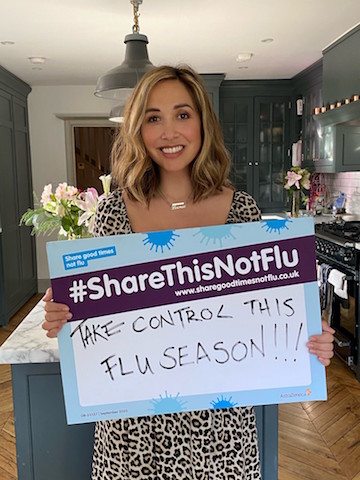 Last year, just 43.8 per cent of eligible children aged two to three and 60.4 per cent of eligible primary-school aged children were vaccinated against flu.1 The Government has set an ambition for at least 75 per cent of eligible children to be vaccinated this year.
Last year, just 43.8 per cent of eligible children aged two to three and 60.4 per cent of eligible primary-school aged children were vaccinated against flu.1 The Government has set an ambition for at least 75 per cent of eligible children to be vaccinated this year.
AstraZeneca’s Share Good Times Not Flu campaign has launched with support from singer, broadcast presenter and mum of three, Myleene Klass, and TV medic Dr Philippa Kaye, alongside parents and nursery school professionals. The campaign aims to address some of the myths circulating about the flu and help parents make an informed decision about flu vaccination by sharing up-to-date and accurate information through a series of bite-size videos on social media, via the campaign hashtag #ShareThisNotFlu.
As well as asking parents to take flu seriously, Myleene Klass has joined the Share Good Times Not Flu campaign to make sure responsible messages about flu are reaching UK parents. "I want to encourage parents to consider the flu vaccination, to help protect their children but to also help prevent spreading flu to other vulnerable people. I’ve already sent the school consent letter back and my children will be receiving their flu vaccination.”
TV medic, NHS doctor and mum-of-three, Dr Philippa Kaye, explains why messages about flu and the immune system can be confusing: “Many people think it’s best to allow your body to fight flu naturally, and I think this confusion is partly due to us doctors saying that getting lots of coughs and colds when you’re young is good for your immune system. But flu is different. Flu is not the common cold, the sore throats or earaches. It is a respiratory infection that can have very serious complications. Many people can get over it on their own but we have no way of knowing which children will get really sick, and which ones won’t. We all want our own immune system to be exposed and strong, and having the vaccine does that. You don’t need to have flu naturally with all the risks that come with it.”
Compared to what has been seen with COVID-19 the risk of the flu virus having a severe impact on a child’s health is higher, and children under the age of five have the highest rate of hospital admissions due to flu. Not only this, they are super-spreaders of flu because they generally do not use tissues properly or wash their hands, and also stay infectious for longer. This means the virus can spread easily between children and to other adults. As the flu vaccine helps to prevent the spread of flu, it can help protect children as well as their family against the virus, which is particularly important for more vulnerable relatives who are at greater risk from flu and complications from COVID-19.
Exceeding the Government’s ambition for at least 75 per cent flu vaccine uptake may help to protect many vulnerable people this winter, and could avoid thousands of people unnecessarily coming down with flu. This will reduce the spread of flu and relieve pressure on the NHS, hospitals and emergency care services, particularly with COVID-19 still circulating.
Share Good Times Not Flu is making parents aware that the vaccine is available through the NHS Childhood flu Immunisation Programme as a free nasal spray rather than an injection, and is encouraging parents to take simple steps to protect their families before the flu season begins by:
Returning the flu consent letter to school for primary school aged children (and year 7s in England)
Booking a GP appointment for eligible two and three-year-old children (GP surgeries will follow guidance on social distancing and personal protective equipment to reduce the risk of COVID-19 transmission during appointments).
Showing NHS support by reminding others to get their child vaccinated and consider sharing NHS advice using the #ShareThisNotFlu message on social media
Learning more about why and how parents can help protect their children, childminders, family, friends and others against flu at Share Good Times Not Flu, where a series of short videos have been created with Myleene Klass, Dr Philippa Kaye, parents and nursery school practitioners having open and informative discussions about flu.
